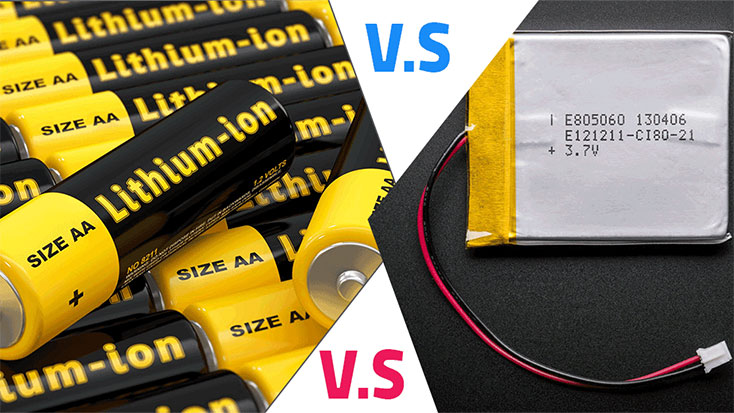Both lithium-ion and lithium-polymer batteries are advanced energy storage technologies widely used in modern electronic devices. While both rely on lithium ions to generate electrical energy, they differ significantly in structure, performance, and applications. These differences affect the capacity, safety, weight, size, and cost of each battery type.
Lithium-ion batteries use a liquid electrolyte, offering higher energy density and longer lifespan, whereas lithium-polymer batteries utilize a gel-like or solid electrolyte, allowing for more flexible designs and lighter weight. As a result, each type of battery is better suited for specific uses — such as smartphones, laptops, drones, or other portable devices.
In this article, we’ll explore the key differences between lithium-ion and lithium-polymer batteries, highlighting their unique features, advantages, and ideal use cases to help you choose the right battery for your needs.
What Is a Lithium Battery?
Lithium batteries are among the most commonly used rechargeable batteries in the modern world. Known for their high energy density, long lifespan, and lightweight design, they power a wide range of electronic devices — from smartphones and laptops to electric vehicles.
These batteries consist of a cathode, anode, and electrolyte, where lithium ions move between the electrodes, enabling the charge and discharge process.
For a detailed overview of lithium battery technology, including its advantages, disadvantages, and practical applications, refer to our comprehensive article:
What Is a Lithium-Ion Battery?
A lithium-ion battery is one of the most widely used rechargeable battery types today, found in a variety of devices such as mobile phones, laptops, tablets, electric vehicles, and power tools.
In lithium-ion batteries, lithium ions play the central role in generating energy. During discharge, these ions move from the negative electrode (anode) to the positive electrode (cathode), creating an electric current that powers the device. During charging, the process reverses, and the ions return to the anode, storing energy for later use.

Applications of Lithium-Ion Batteries
Lithium-ion batteries have become one of the most widely used energy sources today due to their high energy density, lightweight design, and long lifespan. They are utilized across a broad range of devices and industries:
- Mobile Phones and Tablets: Nearly all smartphones and tablets are powered by lithium-ion batteries.
- Digital Cameras: These batteries allow photographers to capture more shots without frequent battery replacement.
- Electric Vehicles (EVs): Lithium-ion batteries serve as the primary energy source in electric and hybrid vehicles.
- Energy Storage Systems: Used to store energy generated from renewable sources such as solar and wind power.
- Aerospace Industry: Employed in satellites and unmanned aerial vehicles (UAVs) due to their lightweight and reliability.
- Portable Audio Devices: Music players and Bluetooth speakers often rely on lithium-ion or lithium-polymer batteries for compact power solutions.
What Is a Lithium-Polymer Battery?
A lithium-polymer (Li-Po) battery is a type of rechargeable battery that uses a polymer-based electrolyte instead of a liquid one. This design makes Li-Po batteries more flexible, lighter, and in some cases, safer than traditional lithium-ion batteries.
Due to their high energy density and flexible form factor, these batteries are widely used in portable electronics such as smartphones, tablets, laptops, drones, and wearable devices. Although their energy density is slightly lower than that of lithium-ion batteries, their lightweight and design versatility make them ideal for applications that require compact and customized battery shapes.
However, lithium-polymer batteries must be handled and charged carefully to ensure safety and long-term performance.
Applications of Lithium-Polymer Batteries
Lithium-polymer batteries are used in a wide variety of devices and industries thanks to their unique benefits:
- Smartwatches and Fitness Bands: Their thin and flexible design makes them perfect for wearable devices.
- Smart Glasses: Used to power displays and sensors in modern smart eyewear.
- Racing Drones: Ideal for drones requiring lightweight power and high discharge rates.
- Lightweight Electric Vehicles: Commonly used in compact electric cars with aluminum or lightweight bodies.
- Curved Electric Vehicles: Their flexible structure allows designers to shape batteries for specific curved sections of vehicles.
- Medical Infusion Pumps: Provide reliable and portable energy for medical delivery systems.
Key Differences Between Lithium-Ion and Lithium-Polymer Batteries
Although both types of batteries use lithium ions to store and deliver energy, they differ in several important ways:
- Electrolyte Composition:
Lithium-ion batteries use a liquid electrolyte, whereas lithium-polymer batteries employ a gel-like or solid electrolyte, offering more flexibility and lighter construction. - Energy Density and Lifespan:
Lithium-ion batteries generally provide higher energy density and longer cycle life, making them ideal for devices that require longer operating times. - Design and Weight:
Lithium-polymer batteries are better suited for thin and lightweight devices like drones, RC models, and specialized instruments. - Safety:
Li-Po batteries are often considered safer since they have a lower risk of electrolyte leakage or swelling.
In general, lithium-ion batteries are widely used in laptops, smartphones, and consumer electronics, while lithium-polymer batteries are preferred for lightweight, design-specific applications that require compactness and flexibility.
Conclusion
Ultimately, choosing between lithium-ion and lithium-polymer batteries depends on your specific needs and priorities.
If you value higher energy density, longer lifespan, and cost efficiency, lithium-ion batteries are the better choice.
However, if lightweight design, shape flexibility, and compact applications (such as drones or slim devices) are important, lithium-polymer batteries are ideal.
Both battery types offer unique advantages and can perform exceptionally well when maintained correctly. For personalized guidance and professional advice, contact our experts at Soran Service Novian — we’re here to help you choose the most suitable battery solution for your requirements.




No comments yet.